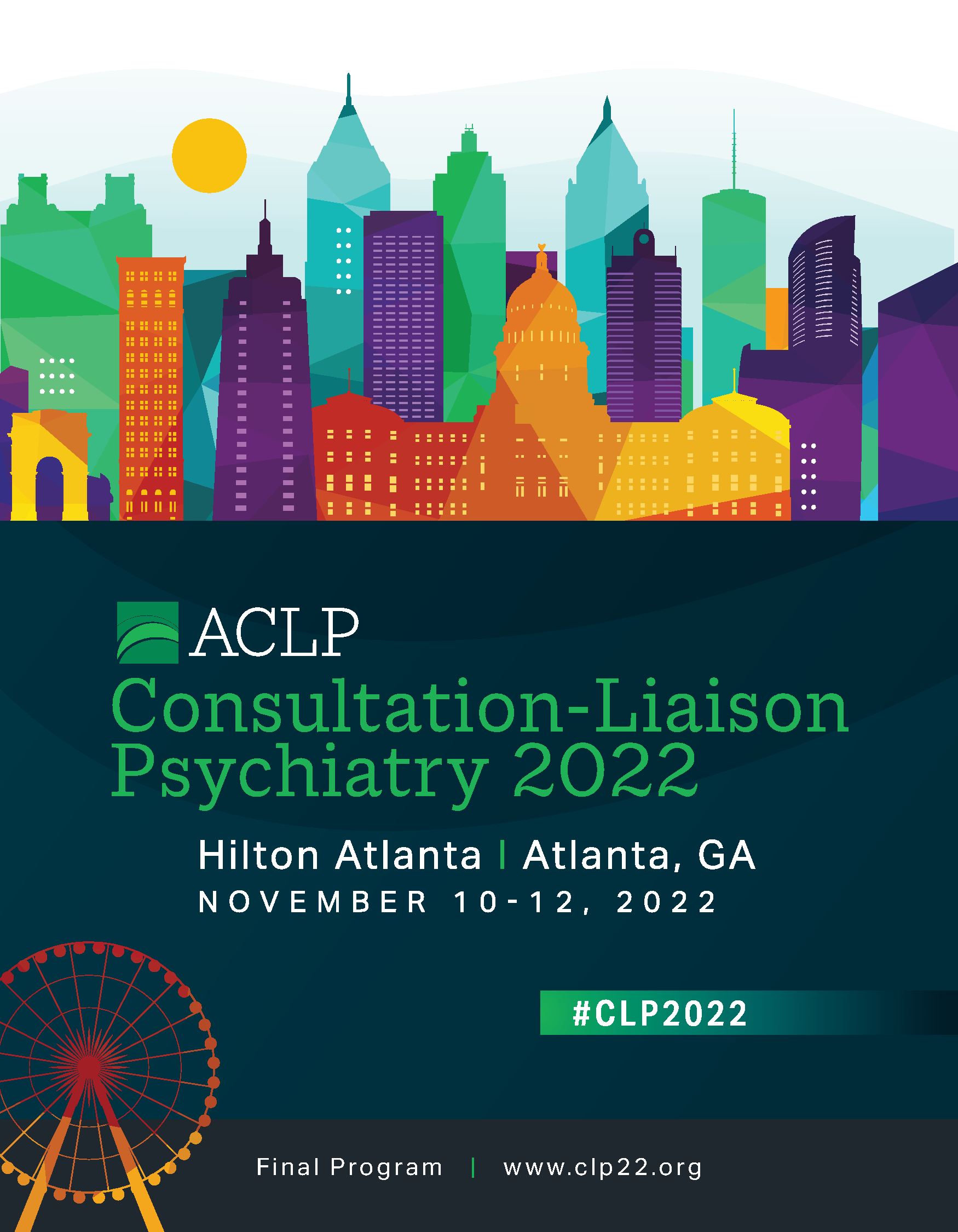Back
Brief Oral Papers
Session: Oral Presentation Session 10: Potpourri 2
WEBB FELLOW: Development and Implementation of an Involuntary Hold for Medical Incapacity in an Academic Hospital: A Quality Improvement Project
Friday, November 11, 2022
2:15 PM – 3:45 PM
Location: Room 203
- AM
Amanda Mihalik-Wenger, MD
Resident Physician
UF Health
Seattle, Washington 
Sheryl Fleisch, MD, FACLP
Chief, Division of Consultation-Liaison Psychiatry
University of Florida College of Medicine
Gainesville, Florida
Presenting Author(s)
Co-Author(s)
Abstract:
Background: How to protect patients attempting to leave the hospital against medical advice who do not have capacity to make that decision due to medical illness is a subject of increasing interest, both nationally and at UF Health. The decision to detain a medically ill patient attempting to leave must factor in ethical, legal, and practical considerations. Multiple stakeholders are involved, including the patient, primary medical provider, psychiatry C-L team, nursing, hospital administration, hospital security, and ethics committees. This topic is relevant to C-L psychiatrists who are often consulted to assess capacity to leave AMA or encounter patients under psychiatric involuntary holds who lack capacity but do not have a psychiatric illness. Many hospital systems lack a formalized procedure for medical holds and thus research shows that psychiatric involuntary holds are often used instead. In two studies, medical incapacity accounted for about twenty percent of involuntary psychiatric holds (Cheung et al, 2011). Clarity and standardization of the procedure for medically incapacitated patients is necessary to protect patient rights and safety and help physicians and staff feel confident in avoiding ethical or legal consequences.
Methods: Psychiatry residents were surveyed to assess their understanding of medical incapacity and evaluating the need to develop a medical incapacity hold. All involuntary psychiatric holds in the hospital over a 10-day period were reviewed, examining the listed diagnosis on the involuntary hold and comparing it to the legal criteria for the hold according to Florida law. Based on the evaluated need, a longitudinal quality improvement project was launched using the interdisciplinary Behavioral Health Work Group (BHWG) at UF Health. Colleagues at other institutions who had established medical incapacity policies were consulted and shared copies of their hospital policies. A policy was developed, and monthly case reviews of the medical holds were completed.
Results: The resident surveys identified that involuntary psychiatric holds were often used to detain patients with medical incapacity and that hospital staff lacked consensus on how to manage such patients. This was confirmed reviewing psychiatric holds, identifying ten percent with non-qualifying diagnoses according to Florida law. A decision-making algorithm was designed with input from the BHWG to distinguish the different involuntary holds in Florida, and a formal policy was developed and approved by hospital administration. Project leaders also coordinated with Epic IT services, creating a template for documenting the capacity assessment and order set for the hold. A short training video was then designed and released as mandatory training for hospital staff. The BHWG was updated monthly on the progress of the project and identified other interventions necessary for the success of the policy.
Conclusions: Overall the policy was well-received and supported by hospital administration. Collaboration with many disciplines was critical for its success.
Background: How to protect patients attempting to leave the hospital against medical advice who do not have capacity to make that decision due to medical illness is a subject of increasing interest, both nationally and at UF Health. The decision to detain a medically ill patient attempting to leave must factor in ethical, legal, and practical considerations. Multiple stakeholders are involved, including the patient, primary medical provider, psychiatry C-L team, nursing, hospital administration, hospital security, and ethics committees. This topic is relevant to C-L psychiatrists who are often consulted to assess capacity to leave AMA or encounter patients under psychiatric involuntary holds who lack capacity but do not have a psychiatric illness. Many hospital systems lack a formalized procedure for medical holds and thus research shows that psychiatric involuntary holds are often used instead. In two studies, medical incapacity accounted for about twenty percent of involuntary psychiatric holds (Cheung et al, 2011). Clarity and standardization of the procedure for medically incapacitated patients is necessary to protect patient rights and safety and help physicians and staff feel confident in avoiding ethical or legal consequences.
Methods: Psychiatry residents were surveyed to assess their understanding of medical incapacity and evaluating the need to develop a medical incapacity hold. All involuntary psychiatric holds in the hospital over a 10-day period were reviewed, examining the listed diagnosis on the involuntary hold and comparing it to the legal criteria for the hold according to Florida law. Based on the evaluated need, a longitudinal quality improvement project was launched using the interdisciplinary Behavioral Health Work Group (BHWG) at UF Health. Colleagues at other institutions who had established medical incapacity policies were consulted and shared copies of their hospital policies. A policy was developed, and monthly case reviews of the medical holds were completed.
Results: The resident surveys identified that involuntary psychiatric holds were often used to detain patients with medical incapacity and that hospital staff lacked consensus on how to manage such patients. This was confirmed reviewing psychiatric holds, identifying ten percent with non-qualifying diagnoses according to Florida law. A decision-making algorithm was designed with input from the BHWG to distinguish the different involuntary holds in Florida, and a formal policy was developed and approved by hospital administration. Project leaders also coordinated with Epic IT services, creating a template for documenting the capacity assessment and order set for the hold. A short training video was then designed and released as mandatory training for hospital staff. The BHWG was updated monthly on the progress of the project and identified other interventions necessary for the success of the policy.
Conclusions: Overall the policy was well-received and supported by hospital administration. Collaboration with many disciplines was critical for its success.

